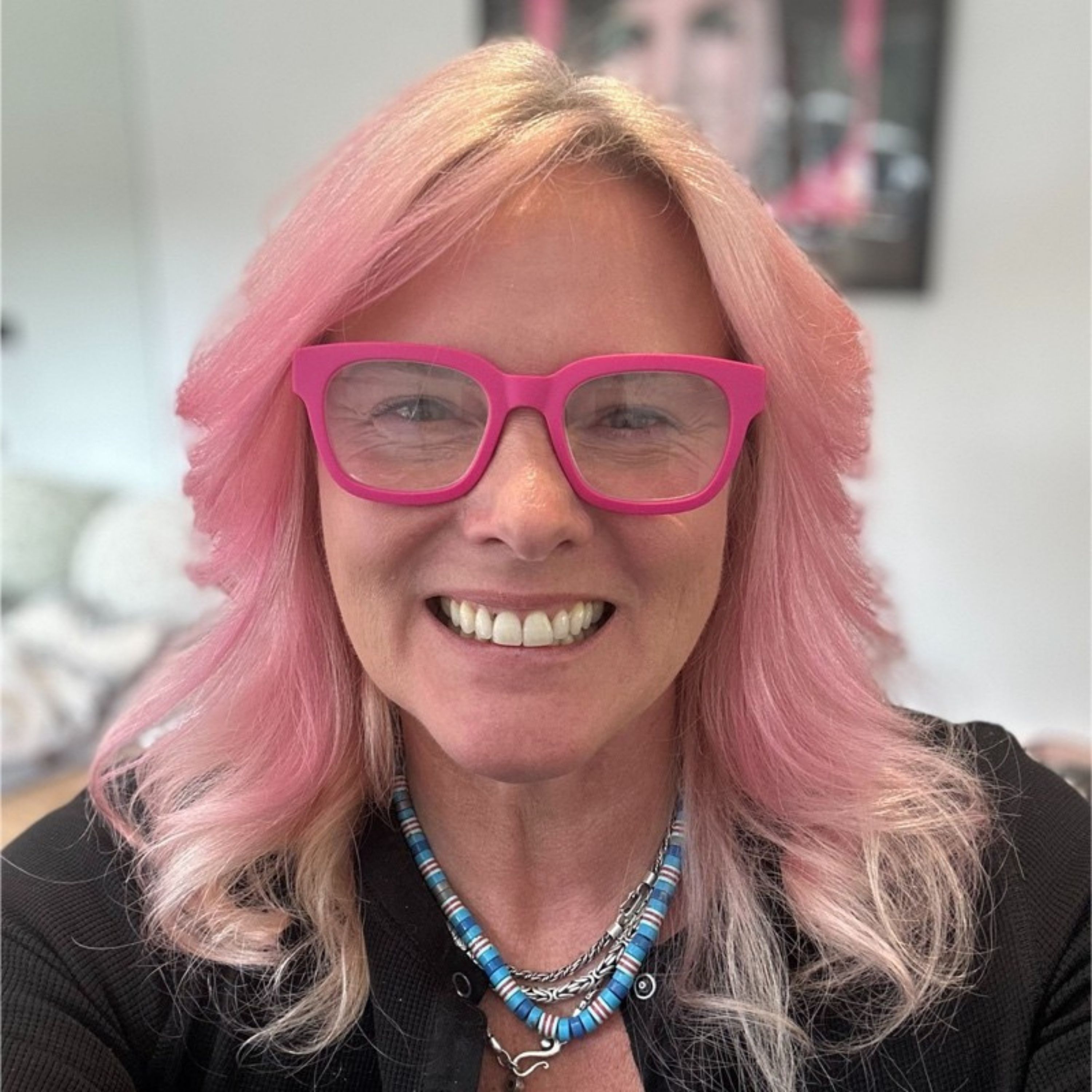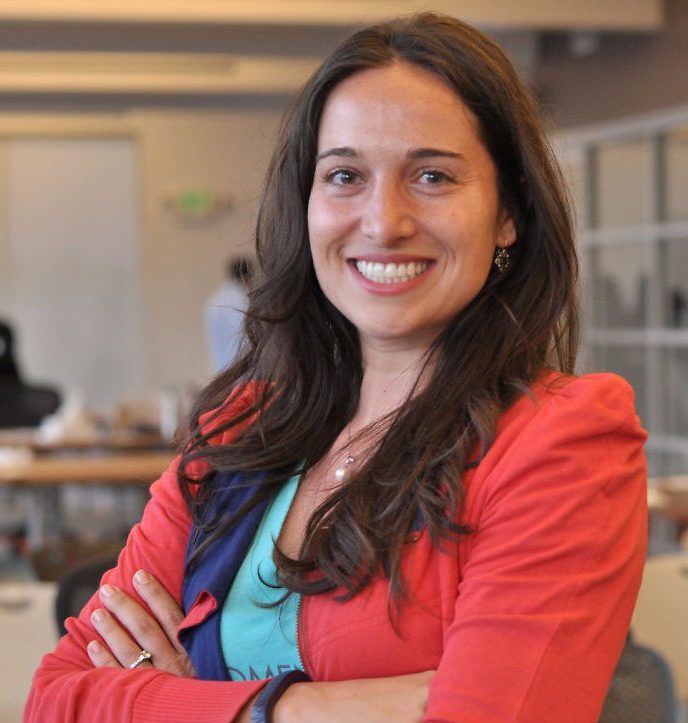
Tech Talent Spotlight Series: Sheridan Ash MBE
11 Dec, 20237Sheridan is the founder and co-CEO of the charity, Tech She Can, an industry-led tech educat...

Sheridan is the founder and co-CEO of the charity, Tech She Can, an industry-led tech education and careers charity with over 250 member organisations spanning more than 40 sectors across all regions of the UK.
The goal of Tech She Can is to create initiatives and pathways to increase the number of women in technology.
Sheridan's journey is indeed a remarkable and inspiring one. Overcoming challenges such as dyslexia, leaving school without formal qualifications, and navigating the complexities of single motherhood, she exemplifies resilience and determination. Her transition from a career in fashion modeling to a successful path in technology showcases her adaptability and willingness to embrace change for the betterment of her and her son's future.
Achieving an MBA from Imperial College and holding impactful leadership roles in global technology companies, including her position as a Leader in Tech and Innovation at PwC UK, demonstrates her competence and ability to excel in a male-dominated industry. Sheridan's commitment to promoting gender equality in STEM is evident through the research she commissioned Time to Close the Tech Gender Gap, founding of the Tech She Can Charter in 2018 and then working with partners across the industry to turn it into a charity in 2020.
Tech She Can, as a charitable initiative, plays a crucial role in addressing the gender disparity within the tech industry. By inspiring young girls and women to pursue careers in STEM, and providing them with role models, mentors, and educational resources, the organization has made a significant impact. The outreach to 62,000 students in UK schools and the training of nearly 500 champions as STEM ambassadors reflect the tangible efforts to bridge the gender gap in these fields.
Sheridan's advocacy for women's visibility in STEM fields is not only a call to action but also a reflection of her commitment to creating a more inclusive and diverse industry. By serving as a role model herself, she encourages girls and young women to believe in their potential and aspire to successful careers in STEM. Her journey serves as a testament to the possibilities that can be achieved through perseverance, education, and a commitment to making a positive impact on the world.
Sheridan was named 3rd and co-CEO Dr. Claire Thorne 8th in Computer Weekly's 2023 50 Women in Tech and was recognised by Forward Ladies as Business Women of the Year and Social Impact Leader of the Year. In 2020. Sheridan was awarded an MBE in the Queen’s Birthday Honours list for services to young girls and women through technology.
Your CV is pretty diverse, and you followed an interesting, slightly unconventional route to where you are in your career today. How did you get where you are today and what was that journey like?
My journey from where I started to where I have ended up is very unusual, to say the least. It all started in a glamorous place called Wellingborough, and I spent my years from early teenage plotting how to escape it. Unfortunately, I didn’t have the best start with my quest as I left school at 16 with very few qualifications, having undiagnosed dyslexia. The only career advice I was given was that as I was pretty I would get a rich husband. I was bullied a lot for being dumb with plenty of fistfights and name-calling every week!
Then I got a lucky break. I was spotted out shopping on a day trip to London with my mum, and approached by a modeling agent who was just coming out of her office in Bond Street. I was offered a job as a fashion model! So I didn’t just get out of Wellingborough. I was living and working in London at 16, traveling to Milan, Paris, etc. This was a really fun time in my life. But, regrettably, I wasn't much of a party girl! If only I could go back in time! I had so much common sense for one so young. I only really realised this as I got older. So there were no drugs, rock ‘n’ roll, and famous men (well maybe there was one!). It was quite a scene, though, and I’m eternally grateful there was no social media in those days!!
For various reasons I ended up as a single parent in my early 20s. This was tough at times but I loved being a mum and although we didn’t have much it was overall a very happy time. Being a responsible single mum was a big wake-up call - I needed a long-term career. I went to university to study Psychological Sciences. At University I got help with my dyslexia. I then worked in the Pharmaceutical industry in sales and marketing and was promoted quickly. However, I soon got bored and wanted more intellectual challenges. So I went on to do an MBA at Imperial College (despite not having the entry requirements - I had to fight my way in). This is where my interest in Technology and Innovation was sparked.
After the MBA I joined Accenture, where my tech career took off. I led multiple large, often global, technology programmes. I then joined PwC where I was given huge opportunities to work with the Board to develop the firm’s technology and innovation strategy. This is where I started to recognise I wanted to do something about the tech gender gap. I saw there were problems in all aspects that prevented girls and women from getting into tech: the education pipeline; attracting young women coming out of education; retention, development, advancement; maternity leave, etc. This is where I first started to understand this concept of equity and how it is key to solving the diversity problem. It was a lightbulb moment - not everyone was starting from the same position! I understood this as a person from my background, a single parent and neurodivergent. We need to level the playing field.
For mothers coming back from maternity leave, for example, we need to give them the skills they need to be confident and the ability to work flexibly. At PwC we found that young people who were in the education system during the pandemic did not have the same level of relationship skills, confidence, etc. that we would have expected - we needed to address this in our recruitment process to give them the support they needed to do well. I’m pleased to say that due to our efforts, PwC’s female tech workforce has increased from 14% to 35% of the total, with over 40% of new job applications from women.
As the founder of The Tech She Can, you actively support educating and motivating more girls and women to seek employment in studies linked to technology. Why do you actively encourage girls and women from diverse backgrounds to consider jobs in technology?
I have been on a mission for years to change the ratio of women in technology jobs and careers, but at the moment there is such a sense of urgency - decisions are being made that affect our economy, our society and our future - and these are happening without women being involved! Did you know that only 1 in 4 tech workers are women? And when you get to the leadership level that drops to 1 in 10? We need women to be equal members in creating and developing the new technology businesses, products, and services that shape our world, ensuring technology works for all. Making this happen is what drives me.
The technology sector has a visible diversity problem; why is having a representation of women in IT industries of such significance to the field's future?
If we want to drive growth and productivity in the UK, skills and diversity in tech are fundamental. But, in the UK workforce, there is a digital skills gap that is estimated to cost the economy £60bn a year.
One-fifth of schools in England do not offer Computer Science at GCSE. This means many young people will not have the opportunity to develop the skills they need for the future of work. And it restricts the pipeline of tech talent the UK needs to thrive. And, despite progress, only one in four people working in tech are women. And when you look at the leadership level, this drops to one in ten.
Tech She Can sees the opportunity to tackle simultaneously both the skills gap and the lack of diversity The UK’s tech skills gap could be solved today, if we had the same number of women as men in tech. Furthermore, technologies, products, and services are being created, tested, and deployed by people who don’t represent society as a whole.
Now, more than ever, representation matters.
Tech She Can is acting now to provide initiatives and pathways to tackle the skills gap and lack of diversity. Together. We start early, inspiring primary school children on tech careers, through to supporting women in the current workforce to learn new skills and pivot into tech.
Why is it so crucial to close the skills gap in technology, and what can businesses do to make this happen?
The baseline is that there are too few women in tech, and this is a critical issue for everyone. It means technology is not fit for all people, which impacts individual aspirations and contributions on the one hand, and organisation’s and the economy's ability to thrive and grow on the other.
If there were as many women working in tech roles as men, for example, there would not be the £60 billion-plus tech skills gap in the UK. But it’s not just about women. It’s about improving diversity overall. If organisations were better at attracting and retaining diverse groups of women and advancing them into leadership positions they would see better innovations and growth. They would have a better culture and products and services that are more likely to appeal to everyone.
I would like to see if businesses can:
• Support Tech She Can to grow the pipeline and also provide apprenticeships for women of any age to reskill/upskill - returners etc.
• Not just talk the talk, have policies to support women at all levels.
• Put up more ladders for them to climb.
• Throw nets more widely to capture all the diverse talents women possess.
Congratulations on being placed 3rd and your co-CEO Dr Claire Thorne 8th in Computer Weekly's 2023 50 Women in Tech. This is great for Tech She can and shows the impact it's having through this recognition for you both. Please tell us why women must have role models in the sector who are passionate about and encouraging computer career options.
By far one of the most valuable things we do at Tech She Can is provide relatable role models that we showcase from our strategic partner organizations. Girls and young women see women they relate to - from the same places they come from - having successful and rewarding careers in tech. 80% of the girls on one of our Career Insight days said the days changed their thoughts about their next step. We also see their understanding, and interest, in different career paths grow, with 70% interested in tech apprenticeships after the day.
But, most importantly, we ignite their passion. 95% said they thought a tech career would be exciting - almost 5 times as many as before!
I think the work you're doing to promote more inclusion of the younger generation of girls in the tech business through TechSheCan is exceptional. What is the goal of the TechSheCan initiative, and why is it crucial to actively encourage more young females to pursue STEM fields while also enhancing technology education in schools?
Our mission is For women to be equal members in creating and developing the new technology businesses, products, and services that shape our world, ensuring technology works for all.
We're on a mission for an equal future.
It's important because, we don’t know what the jobs of the future will be, what the workplace will look like, or how major challenges such as climate change and personalised medicine will be tackled by the next generation. But we do know that technological innovations will shape the businesses, products, solutions, infrastructure and services that underpin our world.
Yet, the current curriculum may be training children for skills that might not be relevant in the future job market. One concern is the lack of visible role models, with the common reference to historical figures like Ada Lovelace, who is often described as "white and dead," indicating a need for more diverse and contemporary role models.
To address these issues, we need a more agile curriculum that adapts to the changing needs of the workforce. This entails the establishment of a dedicated industry task force to ensure the curriculum remains industry-relevant and responsive to the dynamic nature of STEM fields. There is an urgency to integrate AI education into the curriculum, considering that AI is not just a future prospect for school children but an integral part of their present, and to foster inspiration and practical skill development, we need to incorporate it into students' education and not only teach it but teach WITH it.
We also know that women’s creativity and innovations are critical in developing technology that works for all and it's less likely to be biased with diverse people involved. Tech She Can’s mission is to make sure that everyone has the opportunity to participate in developing technology, and for women to play an equal role in how our world works, looks, thinks, and feels.
On reflection of your career journey, what would be the one piece of advice that you would give to someone thinking about career opportunities in technology?
Be Impatient, don't wait for change, and find a way to lead change, every little bit you do helps.
A huge thank you to Sheridan Ash MBE for dedicating her time to this interview. If you would like to find out more information about Sheridan or the incredible initiative then check out their website Tech She Can to see how you can get involved or alternatively then head to her LinkedIn profile here.
If you, like Sheridan, have an inspiring story to tell within Technology or IT Infrastructure then please get in contact today for us to share your story.









